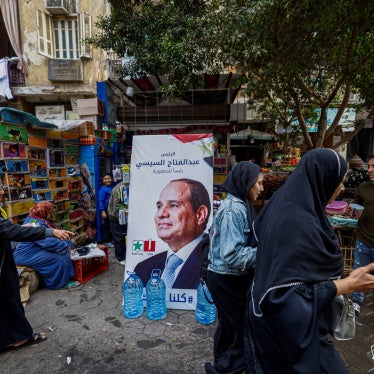To the governments of Saudi Arabia and Indonesia:
We write to bring your attention to the severe abuse of an Indonesian woman, Keni binti Carda, during her employment as a domestic worker for Khalid and Wafa al-Khuraifi in Medina, Saudi Arabia last year.
We have provided information about the abuse in this letter, including visual documentation of the injuries sustained. We urge the Saudi and Indonesian authorities to coordinate to investigate this case, prosecute the abusers in accordance with international standards, and provide financial compensation and appropriate support services to the victim.
This letter also elaborates longstanding concerns about migrant women's access to the justice system with recommendations for key reforms. We recognize that both the Saudi and Indonesian governments have taken steps in recent years to begin addressing protection of migrant domestic workers, and we encourage further progress in this direction.
We hope that both governments will use this opportunity, and the unacceptable abuse and mutilation of Keni binti Carda, to demonstrate that abuse of domestic workers will not be tolerated. We urge you to show the political will to ensure meaningful protection for domestic workers in the future.
The Case of Keni Binti Carda
Originally from Bresbes district in Central Java, Indonesia, Keni binti Carda, age 28, migrated to Saudi Arabia as a domestic worker in July 2008. She worked for Khalid and Wafa al-Khuraifi in Medina and says that her abuse at the hands of Mrs. al-Khuraifi began in September during Ramadan, due to her anger in regards to new employment contracts that raised the salary for Indonesian domestic workers to 800 riyals (US$213) per month from 600 riyals (US$160).
The abuse allegedly inflicted by Wafa al-Khuraifi on Keni binti Carda includes repeated burning with an iron, forced ingestion of feces, psychological abuse, and application of household cleaners to open wounds. Mrs. al-Khuraifi also poked Keni's tongue with a knife, pried her teeth loose and forced them down her throat, beat her own children when they tried to protest, and threatened Keni with a grisly death if she tried to escape.
In addition to the beatings and other physical abuse, Keni binti Carda says her employers made her work from 6 am to 3 am each day, physically trapped her in the house, and forced her to leave Saudi Arabia before she could seek help from authorities.
In October 2008, Keni binti Carda says Wafa al-Khuraifi took her to the airport and threatened to have Saudi police imprison her if she reported the abuse. Since she was wearing an abaya, which covered her completely, fellow travelers and airport officials did not observe her medical condition. When she arrived in Jakarta, Indonesian officials took her directly to Sukanto Police Hospital, which has a special clinic for the numerous migrant women who return to Indonesia with injuries from abuse while working abroad.
Keni binti Carda is currently receiving treatment for her extensive injuries. She has impaired vision in one eye, and her flesh is fused together in some places where al-Khuraifi allegedly burned her.
Recommendation to the Saudi and Indonesian governments:
- Cooperate closely to begin an investigation, register Keni binti Carda's case with the Saudi police, arrange for legal representation through the Indonesian embassy in Riyadh, and seek both criminal penalties and financial compensation.
Concerns about Access to the Justice System
While many domestic workers enjoy satisfactory work conditions in Saudi Arabia, many others, like Keni binti Carda, confront a range of abuses. These include non-payment of salaries, forced confinement by employers, excessive workload, and in some instances, physical and sexual abuse. In such cases, migrant women face multiple barriers to seeking redress through the justice system.
One reason is Saudi Arabia's kafala (sponsorship) system, which ties migrant workers' employment visas to their employers. Under this system, an employer assumes responsibility for a hired migrant worker and must grant explicit permission before the worker can transfer employment or leave the country. The kafala system gives the employer immense control over the worker. Human Rights Watch has documented numerous cases where workers were unable to escape from abusive conditions or even to return home upon completion of their contracts because their employer denied them permission to leave the country.
Our research indicates that many domestic workers have no opportunity to seek official help given employers' ability to repatriate workers at will, as in Keni binti Carda's case. Furthermore, domestic workers are often completely isolated and confined in the workplace. They are excluded from Saudi Labor Law, which would entitle them to such protections as a weekly day off, a time when they could obtain information or assistance. As a result, they are unable to reach a police station to file a complaint about their abuse. And even if they are able to reach a police station, they often have no way of communicating their complaints, because many do not speak fluent Arabic. They also face the risk of retaliation by their employers, who control not only their livelihoods but their very presence in Saudi Arabia.
For those limited number of cases that do reach the justice system, foreigners confront several serious problems in getting a fair investigation or trial. Many migrant workers do not have access to interpreters, legal aid or basic information about their cases. Many migrant domestic workers face false counteraccusations and cases often drag on for years.
For example, Nour Miyati, an Indonesian domestic worker, sustained serious injuries and lost her fingers due to gangrene in 2005 after her employer locked her up, physically and verbally abused her and deprived her of food. She then faced a countercharge of making false accusations against her employer, for which a court sentenced her to 79 lashes. Another court subsequently overturned that conviction and sentence, but dropped the charges against her employer in 2008 despite ample medical evidence of physical abuse and her employer's confession.
The Indonesian diplomatic missions in Riyadh and Jeddah play a critical role in advocating for their nationals' rights and providing services such as shelter and legal aid. However, they struggle to handle the high volume of complaints given insufficient financial resources and staff. Although they provide key support in many instances, domestic workers approaching them for help complain of long waiting periods with little information about their cases. The shelter operated by the Indonesian embassy in Riyadh is grossly overcrowded with unhygienic conditions, housing many women victims of abuse waiting indefinitely for the resolution of pending criminal cases against their employers or recruitment agents.
Recommendations to the Saudi government:
Fulfill promises to reform or abolish the kafala system so that employers cannot summarily repatriate migrant workers.
Provide training for police to identify and investigate abuse against domestic workers and protocols on how to respond to such situations.
Adopt a proposed annex to the labor law on domestic workers and ensure that it guarantees protections equal to those afforded to other workers, including a weekly day of rest that will be justiciable through the labor courts.
Provide a complaints mechanism geared to the needs of migrant workers, including staff who speak the relevant languages, confidential phone and internet lines, legal assistance, and the assistance of interpreters; make public the results of investigations into worker complaints and the prosecution of abusive employers.
Recommendations to the Indonesian government:
- Monitor criminal cases involving Indonesian nationals closely and advocate on their behalf. Coordinate between the relevant authorities to ensure the legal representation of migrant workers already repatriated to Indonesia who have pending cases in Saudi Arabia.
- Improve services, including quality of shelters, legal aid, availability of counseling, and numbers of trained staff, for migrant domestic workers at embassies and consular offices in Saudi Arabia.
We hope to hear back from you regarding any actions you take to address the specific case of Keni binti Carda, as well as any information you may have for us regarding our recommendations for reform.
Sincerely,
Nisha Varia Miftah Farid
Deputy Director Director
Women's Rights Division Indonesian Migrant Workers Union
Human Rights Watch (Serikat Buruh Migran Indonesia/SBMI)








